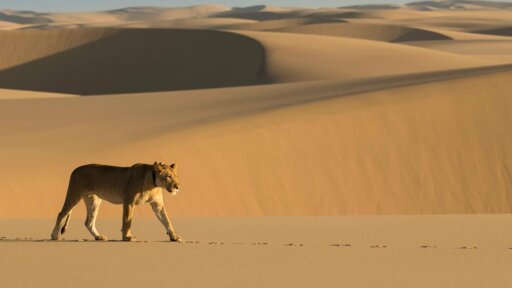Chased by their aunt into an unhospitable part of the desert, the cubs found an oasis where they developed new hunting strategies and became bird hunters, previously unheard of for lions.
Features




- [Narrator] These cormorants hunt fish at sea, but roost and breed at the oasis in the dunes.
It provided a great hunting ground for the orphan sisters.
(wings flapping) (cormorants honking) (water splashing) But trying to catch prey with wings was no easy feat, especially in daytime.
(water splashing) (cormorants honking) [Philip] They quickly realized that the birds congregated in very particular areas at night, and they would devise their hunting strategy around that.
(cormorants honking) (birds singing) (water splashing) - [Narrator] The orphans learned to wait for nightfall before they would strike again.
Philip's own strategy to monitor them in the dark had to be unobtrusive and invisible.
- [Philip] Once I had the right night-vision equipment, their world reopened, and I was able to follow and observe them in great detail.
- [Narrator] By using a thermal camera, the heat radiating from warm bodies painted an extraordinary scene, normally concealed in the dark of night.
- [Philip] And as it got dark, they emerged in stalking mode.
Lions that grow up in a normal environment wouldn't look twice at a bird.
- [Narrator] In the desert, the young orphans' drive of starvation revealed an unusual behavior from deep within.
Their survival instinct would take them to new heights.
The fortune of hunting in a roosting spot, your prey keeps coming back.
But to truly take advantage of this bonanza, they needed to step out of their comfort zone.
Water evokes fear in most cats, but to hunt wetland birds, the sisters had to take the plunge.
(water splashing) - [Philip] I remember feeling so optimistic because they'd become bird hunters.
And that was the beginning of a whole new life for them.
You May Also Like






